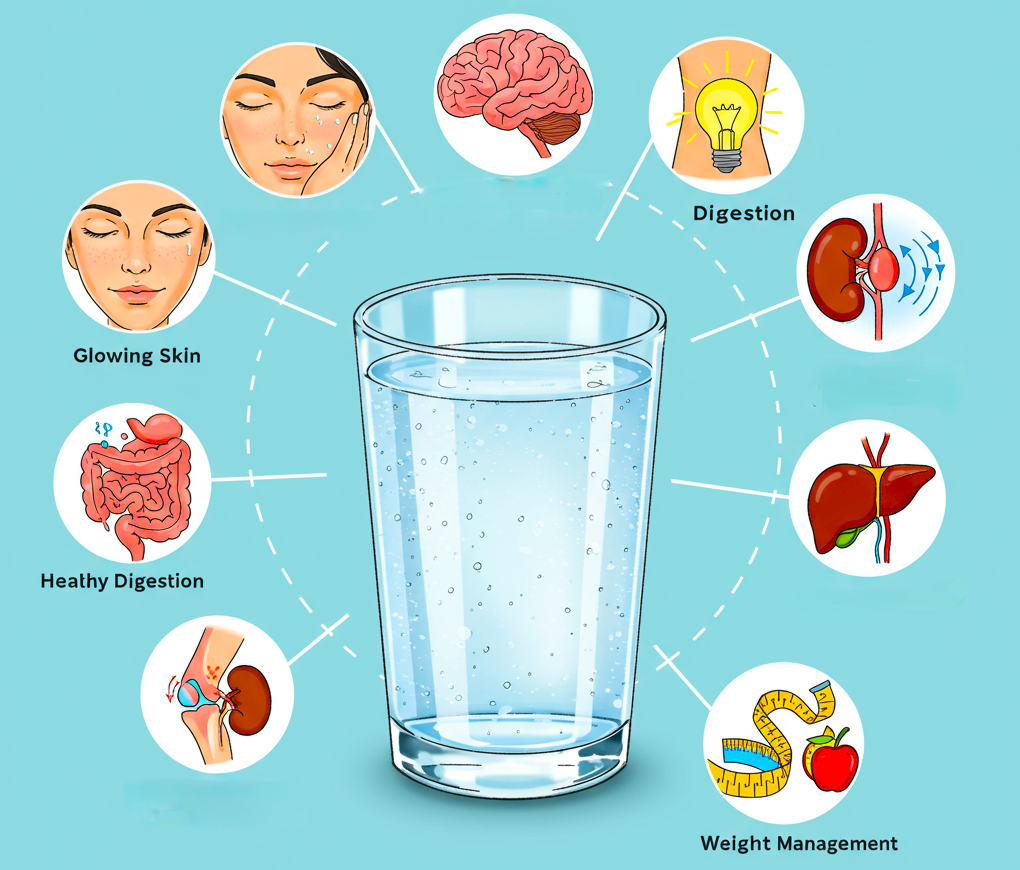Drinking more water daily is one of the simplest yet most powerful habits for better health. Proper hydration supports vital body functions, improves energy levels, aids digestion, and helps regulate body temperature. Despite its importance, many people underestimate how much water their bodies truly need. Understanding the benefits of staying well-hydrated can make a lasting difference to your overall wellbeing.
This guide explains how dehydration affects your brain, heart, skin, and kidneys. You’ll see warning signs, the science behind them, and simple habits to stay safe—grounded in expert insight and local context.

Why Your Body Desperately Needs Water
Your body is made up of roughly 60% water. Every cell, tissue, and organ depends on it to function. Water:
- Regulates body temperature
- Delivers oxygen and nutrients through blood
- Removes waste through urine, sweat, and stool
- Cushions joints and protects organs
According to the World Health Organization (WHO), even a 1-2% loss in body water can impair physical and cognitive performance. (WHO)
Nigeria’s Climate and Water Needs
Specifically, Nigeria’s tropical climate demands higher water intake. The dry season (November–March) brings intense heat, while the wet season’s humidity accelerates sweat loss. According to the Nigerian Meteorological Agency (2024), average temperatures range from 30°C to 38°C, with humidity often exceeding 80%. As a result, Nigerians lose 2–3 liters of water daily through sweat alone.
Dr. Sarah Thompson, a UK-based hydration expert, advises, “In hot climates like Nigeria, aim for 3–4 liters of water daily, compared to 2–2.5 liters in cooler regions.”
Global Relevance
Meanwhile, dehydration is a global concern. In arid regions like the Middle East or humid tropics like Southeast Asia, water loss mirrors Nigeria’s challenges. Even in temperate climates, indoor heating or exercise can dehydrate. A 2024 WHO study estimates that 1 in 4 people worldwide experiences mild dehydration weekly. Thus, the principles of hydration apply universally, though Nigeria’s weather amplifies the urgency.
Research Findings
Recent studies underscore hydration’s importance. For example, a 2023 Nigerian Journal of Clinical Practice study found that 60% of urban Nigerians drink less than 2 liters daily, increasing dehydration risks. Internationally, a 2024 Lancet study reports that 30% of global adults fail to meet hydration needs, linking it to a 15% rise in chronic illnesses.
Additionally, a 2022 UNICEF report highlights Nigeria’s water crisis, noting that polluted water sources force reliance on unsafe alternatives, worsening dehydration. These findings emphasize the need for clean, accessible water.
Expert Opinions
Experts globally and locally stress proactive hydration. Dr. Oluwaseun warns, “In Nigeria, many ignore thirst until it’s too late, especially during outdoor activities.” Similarly, Dr. Michael Greger, a US-based nutritionist, states, “Water is the most underrated nutrient. Chronic low intake silently damages health.” Furthermore, Professor Amina Yusuf, a Nigerian environmental scientist, links hydration to climate resilience: “As Nigeria faces hotter weather due to climate change, water intake must increase to prevent health crises.”

Common symptoms of dehydration
- Fatigue and low energy
- Dizziness or lightheadedness
- Dry mouth and lips
- Headaches
- Dark-colored urine and/or decreased Urination
- Difficulty concentrating
- Constipation
In more severe cases, dehydration can lead to heatstroke, kidney complications, and cognitive confusion—particularly in the elderly and those with chronic illnesses.
Long Term Consequences of Dehydration
Physical Fatigue and Weakness
Initially, inadequate water intake saps energy. Muscles, which are 75% water, struggle to function, causing fatigue. For instance, a 2023 study from the University of Lagos found that students in Nigeria’s humid climate experienced a 20% drop in physical performance when dehydrated. Globally, similar findings emerge. The American Journal of Clinical Nutrition (2024) reports that even mild dehydration reduces endurance by 15% in temperate climates. Therefore, whether in Lagos or London, water fuels stamina.
Brain Fog and Poor Focus: Water’s Impact on Mental Clarity
Water fuels brain function. In a 2012 study published in the Journal of Nutrition, researchers found that mild dehydration significantly impacted memory, attention span, and alertness—especially in young women. (Journal of Nutrition Study)
Dr. Oluwatosin Adebayo, a Nigerian neurologist, explains:
“Even small levels of dehydration can reduce mental performance. Many Nigerians complain of tiredness, yet they don’t realize they haven’t had a glass of water all day.”
Your Kidneys Are Screaming—Are You Listening?
Your kidneys filter waste from your blood and regulate electrolytes. Without enough water:
- Urine becomes concentrated, increasing risk of kidney stones
- You become prone to urinary tract infections (UTIs)
- Chronic dehydration can lead to kidney damage or failure
According to the National Kidney Foundation, staying hydrated is one of the most effective ways to protect your kidneys. (NKF)
Read also: Nigerian Diet Plan for CKD
Increased Cardiovascular Stress
Dehydration thickens your blood, which can raise blood pressure and overwork the heart. A study in the European Journal of Nutrition showed that dehydration leads to higher resting heart rate and lower blood pressure stability. (Study)
Moreover, in Nigeria’s heat, this risk intensifies. A 2024 study from the University of Ibadan found that dehydration increases heart rate by 10% in tropical climates. Globally, the American Heart Association (2023) reports that chronic dehydration raises stroke risk by 20%. Consequently, hydration supports heart health worldwide. Read also: Nigerian Heart Attack Solutions
In Nigeria, where cardiovascular disease is rising, water intake should be part of any prevention plan. Dr. Nkem Okeke, a cardiologist in Abuja, warns:
“When patients say they’re always tired or dizzy, we check their hydration first—it’s often overlooked but critical.”
Digestive Disaster: Constipation and More
Water keeps your digestive system moving. It helps form stool and supports stomach acid and bile production. Without enough water:
- Constipation becomes common
- Digestion slows
- Acid reflux and bloating increase
Drinking enough water can work better than laxatives in some cases. Add fiber and water, and your gut will thank you.
Your Skin is Talking—It’s Thirsty
Dry, flaky skin. Acne. Dull complexion. These are signs your skin lacks hydration from the inside.
Hydrated skin:
- Maintains elasticity
- Appears plumper and smoother
- Heals faster from damage or inflammation. Read also:
According to DermNet NZ, water improves circulation to skin cells, supporting collagen production. (DermNet Link)
How Much Water Do You Really Need?
There’s no universal number that fits all, but general guidelines help. According to the National Academies of Sciences, Engineering, and Medicine (USA), men should aim for about 3.7 liters (125 ounces) of total water intake daily, and women about 2.7 liters (91 ounces). This includes all beverages and water-rich foods like fruits and vegetables.
Still, plain water remains the gold standard. It hydrates without added sugar, caffeine, or calories, making it the healthiest and most efficient option.
Hydration expert Dr. Stavros A. Kavouras, Director of the Hydration Science Lab at Arizona State University, notes:
“Adequate hydration enhances kidney function, reduces the risk of urinary tract infections, and may even lower the incidence of chronic diseases like kidney stones.” (Kavouras, 2019, PubMed).
He adds that consistent water intake—rather than gulping large amounts infrequently—is key. “Thirst is a late sign. If you wait until you’re thirsty, you’re already behind on hydration,” he cautions.
Vulnerable Populations: Who’s at Higher Risk?

Children and Infants
Children have higher water needs relative to their body size and may not always express thirst effectively. With their active lifestyles and sensitivity to heat, they are particularly vulnerable.
Elderly Individuals
As we age, our body’s ability to conserve water declines, and our sense of thirst becomes less reliable. This makes older adults more prone to dehydration, especially if they are on medications like diuretics or have chronic illnesses.
Athletes and Active Individuals
Physical activity increases fluid loss through sweat, especially in hot climates. Without proper hydration before, during, and after exercise, performance and recovery suffer.
People in Hot and Humid Climates
In regions with high temperatures—across parts of Africa, Asia, and the Middle East—water loss through sweat is significant. Hydration becomes even more critical in these settings, especially for outdoor workers and commuters.
People on Diuretics
Did you know coffee, alcohol, and some medications act as diuretics? They increase urination and can contribute to dehydration.
Examples include:
- Caffeinated drinks (e.g., Coke, energy drinks, tea)
- Alcohol
- Blood pressure meds and diabetes drugs
If you consume these, increase your water intake accordingly.
Practical Tips to Stay Hydrated
Here are some simple, science-backed strategies to improve your daily hydration habits:

- Start your day with water: Drink a glass as soon as you wake up to replenish what you lost overnight.
- Carry a reusable water bottle: Having water within reach increases the likelihood of sipping throughout the day.
- Add natural flavor: Infuse your water with fruits like cucumber, lemon, or berries for a refreshing twist.
- Eat water-rich foods: Include foods like watermelon, oranges, cucumbers, and leafy greens in your meals.
- Use reminders: Set hourly alarms or use hydration tracking apps if you tend to forget.Read also: Water Intake Tracker
- Monitor your urine color: Pale yellow indicates proper hydration; dark yellow suggests you need more water.
FAQs on Drinking More Water Daily
- How do I know if I’m drinking enough water daily?
Check your urine. Pale yellow means you’re likely hydrated. Dark yellow or amber means you need more water.
- Is it bad to drink too much water?
Yes, overhydration can lead to water intoxication (hyponatremia). But it’s rare—most people under-drink, not overdrink.
- Can dehydration cause headaches?
Absolutely. Dehydration reduces blood flow and oxygen to the brain, triggering headaches.
- Does drinking cold water help in hot climates?
Yes, cold water cools you faster. But any clean water is better than none.
- What’s the best time to drink water?
Morning, before meals, during workouts, and before bed. Sip small amounts throughout the day.
- Can I replace water with soft drinks?
No. Most sodas are high in sugar and dehydrate you further. Water remains the healthiest choice.
- Is bottled water better than tap water?
In areas with poor water infrastructure, bottled or filtered water may be safer. But clean tap water is just as effective if treated.
- Can dehydration make you tired?
Yes. Low water levels reduce energy production at the cellular level, causing fatigue.
- Can kids get dehydrated faster?
Yes. Children have higher water needs per kg of body weight. Always keep water near them.
- Does zobo or kunu count as water?
Only partially. While they contain water, they also contain sugar or spices. Water should still be your base fluid.
- How can I get kids to drink more water?
Use colorful bottles, flavor water with fruit slices, and model the behavior yourself.
Final Thoughts: Your Health in a Glass
Drinking more water daily isn’t just a health tip—it’s a daily commitment to your body’s vitality. From the cellular level to your energy, mood, and even longevity, water supports it all. The best part? It’s affordable, accessible for many, and entirely natural.
Don’t wait until you feel thirsty. Hydration should be proactive, not reactive.
Track your water intake, eat water-rich foods, and make hydration a lifestyle—not an emergency fix.
Download our free Hydration Tracker PDF now from HealthsClinic.com and start building a habit that could save your life. Your wellness journey starts here! Share your experience in the comments.
This post is for educational purposes only: therefore, consult a doctor before making any medical decisions.
Kindly Subscribe, Like and Share this post.





Very good advice on family health and wellness. Surely looking forward to seeing your next article. Thanks 👍.
Pingback: Home Remedies for Malaria in Nigeria: What Truly Works
Pingback: The Best Diet For Weight Loss And Muscle Gain - Healths Clinic
Pingback: Rainy Season Diseases in Nigeria: Malaria, Typhoid & Cholera
Pingback: Track Daily Water Intake for Optimal Hydration & Health
Pingback: Improve Sleep Naturally: Beat Insomnia Without Pills
Pingback: Boost Immunity Naturally With Nigerian Foods
Pingback: The Burden of Sickle Cell Anemia in Nigeria
Pingback: Top 20 ENT Disorders in Nigeria You Should Know
Pingback: Effective Natural Ulcer Cure Remedies in Nigeria
Pingback: Chronic Kidney Disease: Causes, Symptoms and Management